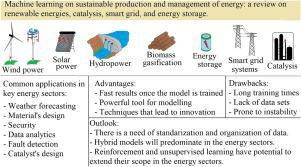Chemical Engineering Research and Design ( IF 3.7 ) Pub Date : 2021-08-17 , DOI: 10.1016/j.cherd.2021.08.013 Daniel Rangel-Martinez 1 , K.D.P. Nigam 2 , Luis A. Ricardez-Sandoval 1

|
This study presents a broad view of the current state of the art of ML applications in the manufacturing sectors that have a considerable impact on sustainability and the environment, namely renewable energies (solar, wind, hydropower, and biomass), smart grids, the industry of catalysis and power storage and distribution. Artificial neural networks are the most preferred techniques over other ML algorithms because of their generalization capabilities. Demands for ML techniques in the energy sectors will increase considerably in the coming years, since there is a growing demand of academic programmes related to artificial intelligence in science, math, and engineering. Data generation, management, and safety are expected to play a key role for the successful implementation of ML algorithms that can be shared by major stakeholders in the energy sector, thereby promoting the development of ambitious energy management projects. New algorithms for producing reliable data and the addition of other sources of information (e.g., novel sensors) will enhance flow of information between ML and systems. It is expected that unsupervised and reinforcement learning will take a central role in the energy sector, but this will depend on the expansion of other major fields in data science such as big data analytics. Massive implementations, specialized algorithms, and new technologies like 5G will promote the development of sustainable applications of ML in non-industrial applications for energy management.
中文翻译:

可持续能源机器学习:可再生能源系统、催化、智能电网和储能的回顾与展望
本研究对制造业中 ML 应用的当前状态进行了广泛的了解,这些应用对可持续性和环境有相当大的影响,即可再生能源(太阳能、风能、水电和生物质能)、智能电网、工业催化和电力储存和分配。由于其泛化能力,人工神经网络是比其他 ML 算法更受欢迎的技术。未来几年,能源领域对机器学习技术的需求将大幅增加,因为对科学、数学和工程人工智能相关学术课程的需求不断增长。数据生成、管理、能源领域的主要利益相关者可以共享的 ML 算法的成功实施,预计安全和安全将发挥关键作用,从而促进雄心勃勃的能源管理项目的发展。用于生成可靠数据的新算法和其他信息源(例如,新型传感器)的添加将增强 ML 和系统之间的信息流。预计无监督和强化学习将在能源领域发挥核心作用,但这将取决于大数据分析等数据科学其他主要领域的扩展。大规模实施、专业算法和 5G 等新技术将促进 ML 在能源管理非工业应用中可持续应用的发展。从而促进雄心勃勃的能源管理项目的发展。用于生成可靠数据的新算法和其他信息源(例如,新型传感器)的添加将增强 ML 和系统之间的信息流。预计无监督和强化学习将在能源领域发挥核心作用,但这将取决于大数据分析等数据科学其他主要领域的扩展。大规模实施、专业算法和 5G 等新技术将促进 ML 在能源管理非工业应用中可持续应用的发展。从而促进雄心勃勃的能源管理项目的发展。用于生成可靠数据的新算法和其他信息源(例如,新型传感器)的添加将增强 ML 和系统之间的信息流。预计无监督和强化学习将在能源领域发挥核心作用,但这将取决于大数据分析等数据科学其他主要领域的扩展。大规模实施、专业算法和 5G 等新技术将促进 ML 在能源管理非工业应用中可持续应用的发展。预计无监督和强化学习将在能源领域发挥核心作用,但这将取决于大数据分析等数据科学其他主要领域的扩展。大规模实施、专业算法和 5G 等新技术将促进 ML 在能源管理非工业应用中可持续应用的发展。预计无监督和强化学习将在能源领域发挥核心作用,但这将取决于大数据分析等数据科学其他主要领域的扩展。大规模实施、专业算法和 5G 等新技术将促进 ML 在能源管理非工业应用中可持续应用的发展。











































 京公网安备 11010802027423号
京公网安备 11010802027423号